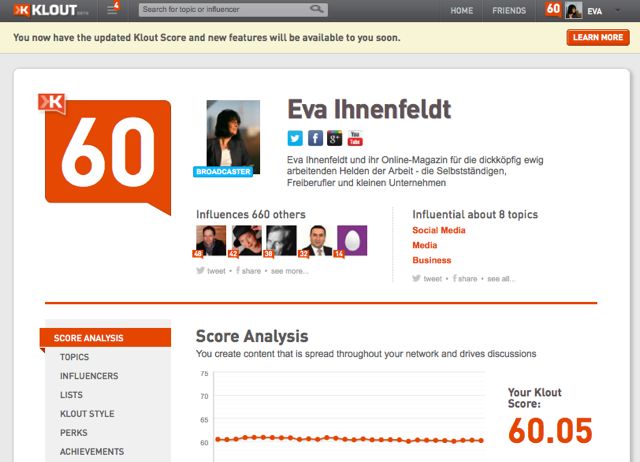Kennen Sie Klout? In den USA ist ein gutes Ranking bei Klout schon für die Karriere unverzichtbar, wenn man Führungskraft ist (also mindestens 45) – und auch in Deutschland wird der „Klout-Wert“ immer mehr zur virtuellen Menschen-Währung. Klout misst die Reputation im Web eines Menschen. Dafür wurden bisher vor allem Twitter- und Facebook Aktivitäten ausgewertet (auch wenn der Gemessene da nichts von wusste und dem nicht zugestimmt hat) – doch nun hat sich der Algorithmus ausgeweitet und Klout misst auch außerhalb des Social Web die Popularität und Beliebtheit der erfassten Männer und Frauen.
Haben Sie schon mal getestet, ob auch Sie bei Klout sind? Geben Sie einfach mal bei Google „klout.com“ und Ihren Namen 
Bisher konnte man sehr leicht den Klout-Wert manipulieren, indem man über Twitter, Google+ und Facebook durch Tricks viele Follower, Fans und Freunde sammelte – das soll mit dem neuen Algorithmus nicht mehr so leicht möglich sein. Klout misst zwar schon immer nicht nur die Anzahl und Aktivität, sondern auch die Interaktivität und den Einfluss der Interaktionspartner – aber bisher spielten andere Portale keine Rolle. Das verzerrte die Ergebnisse. So erschien Justin Bieber mit 100 Klout-Punkten (es gibt 1 – 100 Klout-Punkte) einflussreicher zu sein als der US-Präsident. Nun wertet Klout auch Wikipedia, LinkedIn und andere Webeinträge aus, so dass jetzt endlich Barack Obama über dem Pop-Sänger liegt.
Leider sind deutsche Netzwerke wie Xing noch nicht verbunden, und auch Aktivitäten mit einem Blog werden nicht berücksichtigt. Klout selbst benennt folgende Faktoren zum neuen Algorithmus:
- Facebook:
- Mentions: A mention of your name in a post indicates an effort to engage with you directly.
- Likes: The simplest action that shows engagement with the content you create.
- Comments: As a reaction to content you share, comments also reflect direct engagement by your network.
- Subscribers: Subscriber count is a more persistent measure of influence that grows over time.
- Wall Posts: Posts to your wall indicate both influence and engagement.
- Friends: Friend count measures the reach of your network but is less important than how your network engages with your content.
- Twitter
- Retweets: Retweets increase your influence by exposing your content to extended follower networks.
- Mentions: People seeking your attention by mentioning you is a strong signal of influence. We also take into account the differences in types of mentions, including “via” and “cc”.
- List Memberships: Being included on lists curated by other users demonstrates your areas of influence.
- Followers: Follower count is one factor in your Score, but we heavily favor engagement over size of audience.
- Replies: Replies show that you are consistently engaging your network with quality content.
- Google+
- Comments: As a reaction to content you share, comments also reflect direct engagement by your network.
- +1’s: The simplest action that shows engagement with the content you create.
- Reshares: Reshares increase your influence by exposing your content to extended networks on Google+.
- LinkedIn
- Title: Your reported title on LinkedIn is a signal of your real-world influence and is persistent.
- Connections: Your connection graph helps validate your real-world influence.
- Recommenders: The recommenders in your network add additional signals to the contribution LinkedIn makes to your Score.
- Comments: As a reaction to content you share, comments also reflect direct engagement by your network.
- foursquare
- Tips Done: The number of suggestions you’ve left that have been completed indicate your ability to influence others on foursquare.
- Klout
- +K received: Receiving +K increases your Klout Score by an amount that is capped in every 90-day measurement cycle to protect the integrity of the Score.
- Wikipedia
- Page Importance: Measured by applying a PageRank algorithm against the Wikipedia page graph.
- Inlinks to Outlinks Ratio: Compares the number of inbound links to a page to the number of outbound links.
- Number of Inlinks: Measures the total number of inbound links to a page.
Sicher ist es vor allem Ziel von Klout, Daten zu sammeln, auszuwerten und weiter zu verkaufen – wie bei allen kommerziellen Anbietern, die „kostenlos“ ihren Dienst zur Verfügung stellen. Genau wie bei Facebook, Twitter, Google+. Doch auch in Deutschland ist die Online-Reputation ein wichtiger Messgrad, um „Marktwert“ einer Führungskraft zu bewerten, man sollte Klout also besser nicht einfach naserümpfend ignorieren.
Quelle: Netzwertig






[…] PeerIndex & Co. – für was sind sie nützlich und was taugen sie? | Stand: 29.3.2013 [6] Online-Reputationstool Klout mit neuem Algorithmus | Stand: 29.3.2013 [7] Klout: Social-Media-Ranking erobert den Business-Bereich | Stand: 29.3.2013 […]
[…] Für einen Social Media Experten sieht es ganz dumm aus, wenn er/ sie einen Klout Wert von 20 oder auch 30 hat. Die Professionalität beginnt bei etwa 45, alles darunter sieht nach “Social Web Leiche” aus – das geht definitiv nicht, es schadet der Glaubwürdigkeit. Facebook ist da weniger relevant, da es ein privates Tool ist – der Einfluss bei Twitter zählt viel viel mehr. Darum sollten sich Social Media Manager über Twitter ein eigenes Klout Profil anlegen und immer mal wieder bei Twitter andere gute Twitter Freunde über Klout “plussen”. Was genau Klout ist und wie es funktioniert steht hier in den SteadyNews. […]